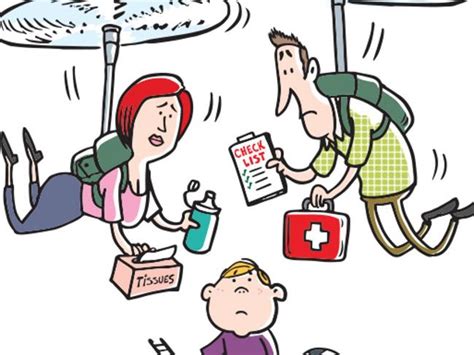
Helicopter parenting, characterized by excessive involvement in a child’s life, persists in various forms, as evidenced by viral social media posts showcasing extreme examples of parental overreach. These instances, compiled in a recent online collection, highlight the ongoing debate surrounding the impact of such intensive parenting styles on children’s development and independence.
The debate over helicopter parenting continues as online users share examples of parental overreach, raising questions about its impact on children’s autonomy and resilience. A collection of 22 screenshots, initially curated and shared across social media platforms, depicts instances of extreme parental involvement in their children’s lives, ranging from intervening in minor disagreements to attempting to control aspects of their adult children’s professional and personal relationships. These examples spark discussions about the boundaries between supportive parenting and stifling over-involvement.
The compilation, which gained traction across platforms like Reddit and X (formerly Twitter), features a variety of scenarios. Some depict parents attempting to mediate minor conflicts between their children and others, while others show parents actively interfering in their adult children’s romantic relationships or career choices. One particularly striking example shows a parent contacting their child’s workplace to complain about a perceived slight. These situations raise questions about the long-term effects of such behavior on children’s ability to navigate challenges and develop essential life skills.
Experts in child development and psychology offer varied perspectives on the phenomenon. While some acknowledge that parental involvement is crucial for a child’s well-being, they caution against crossing the line into over-control. “The goal of parenting is to raise independent, capable adults,” says Dr. Laura Markham, a clinical psychologist and author of several parenting books. “Helicopter parenting can inadvertently hinder this process by preventing children from learning to solve problems on their own and developing a sense of self-efficacy.”
However, proponents of involved parenting argue that in a competitive and often precarious world, a proactive approach is necessary to ensure their children’s success and well-being. They cite concerns about safety, academic achievement, and future prospects as justification for their actions. This perspective is often rooted in a desire to protect children from potential harm and to provide them with every possible advantage.
Critics of helicopter parenting, however, argue that such excessive involvement can lead to a range of negative outcomes, including increased anxiety and depression, decreased self-esteem, and a lack of resilience in the face of adversity. Studies have shown that children raised in overly controlled environments may struggle to make decisions independently and may be more likely to experience emotional distress. The fear of failure, exacerbated by the pressure to meet parental expectations, can also contribute to mental health challenges.
The trend of helicopter parenting is not new, but its visibility has increased with the rise of social media, where parents often share their experiences and seek advice from online communities. This increased visibility has also led to greater scrutiny and debate about the appropriate level of parental involvement in children’s lives. The viral screenshots serve as a reminder of the potential pitfalls of overbearing parenting and the importance of fostering independence and resilience in children.
The examples highlighted in the online collection often depict scenarios where parents are attempting to solve problems or make decisions for their children, even when the children are capable of handling the situation themselves. This can prevent children from developing critical thinking skills, problem-solving abilities, and a sense of self-reliance. Furthermore, it can undermine their confidence and create a dependence on parental intervention that can extend into adulthood.
The debate surrounding helicopter parenting also touches on broader societal issues, such as the increasing pressure on children to succeed academically and professionally, the rising cost of education, and the anxieties surrounding safety and security. These factors can contribute to parents’ desire to protect and guide their children, even if it means crossing the line into over-involvement.
One of the key concerns raised by experts is the impact of helicopter parenting on children’s ability to cope with failure. When parents constantly intervene to prevent their children from experiencing setbacks, they may inadvertently deprive them of the opportunity to learn from their mistakes and develop the resilience needed to navigate life’s challenges. Failure is an essential part of the learning process, and it allows children to develop coping mechanisms and problem-solving skills.
Moreover, helicopter parenting can strain parent-child relationships. As children grow older and seek greater independence, they may resent their parents’ attempts to control their lives. This can lead to conflict and resentment, ultimately damaging the bond between parent and child. It is crucial for parents to gradually relinquish control and allow their children to make their own decisions, even if those decisions sometimes lead to mistakes.
The collection of screenshots serves as a cautionary tale, reminding parents of the importance of striking a balance between support and over-involvement. While it is natural for parents to want to protect their children and ensure their well-being, it is equally important to foster their independence and allow them to develop the skills and confidence needed to thrive in the world.
The long-term consequences of helicopter parenting are still being studied, but preliminary research suggests that it can have a lasting impact on children’s mental health, academic performance, and overall well-being. As children navigate the challenges of adolescence and adulthood, they need to be equipped with the skills and resources to make their own decisions, solve their own problems, and cope with adversity. Helicopter parenting can inadvertently undermine these abilities, leaving children feeling unprepared and overwhelmed.
The discussion surrounding helicopter parenting is not limited to individual families. It also has implications for schools and other institutions that work with children. Educators and administrators are increasingly aware of the challenges posed by overly involved parents and are working to develop strategies for managing these interactions. This may include setting clear boundaries for parental involvement, providing resources for parents who are struggling to let go, and promoting a culture of independence and resilience among students.
Ultimately, the goal of parenting is to raise children who are capable, confident, and independent. This requires a delicate balance of support, guidance, and freedom. Parents need to be actively involved in their children’s lives, providing them with love, encouragement, and a safe and nurturing environment. However, they also need to allow their children to make their own mistakes, learn from their experiences, and develop a sense of self-efficacy.
The viral screenshots serve as a reminder of the potential pitfalls of overbearing parenting and the importance of fostering independence and resilience in children. By recognizing the signs of helicopter parenting and taking steps to avoid it, parents can help their children develop the skills and confidence needed to thrive in a complex and challenging world. The examples highlight the need for parents to reflect on their own parenting styles and to consider the long-term impact of their actions on their children’s development.
The debate continues, highlighting the complexity of modern parenting and the ever-present tension between protecting children and preparing them for the realities of the world. The collection of shared experiences serves as a valuable resource for parents, educators, and anyone interested in understanding the challenges and rewards of raising children in the 21st century. As society continues to evolve, it is crucial to engage in open and honest conversations about parenting styles and their impact on children’s well-being. The screenshots, in their often humorous and sometimes shocking depictions, provide a starting point for these important discussions.
The pervasive nature of technology and social media also plays a significant role in the prevalence of helicopter parenting. Parents can now easily monitor their children’s online activities, track their location, and communicate with them at any time. While these tools can be helpful in certain situations, they can also contribute to a sense of constant surveillance and control. It is important for parents to use technology responsibly and to respect their children’s privacy.
The cultural context also influences parenting styles. In some cultures, parental involvement is highly valued and expected, while in others, independence and self-reliance are emphasized. These cultural norms can shape parents’ beliefs about the appropriate level of involvement in their children’s lives. It is important to be aware of these cultural differences and to avoid making generalizations about parenting styles.
The economic pressures of modern life can also contribute to helicopter parenting. As the cost of education and housing continues to rise, parents may feel compelled to intervene in their children’s lives to ensure their financial security. This can lead to increased pressure on children to succeed academically and professionally, and it can undermine their sense of autonomy and independence.
The psychological impact of helicopter parenting on parents themselves should also be considered. Parents who engage in excessive control may be driven by their own anxieties and insecurities. They may fear that their children will not succeed if they do not intervene, or they may be seeking validation through their children’s accomplishments. It is important for parents to address their own emotional needs and to avoid projecting their anxieties onto their children.
The discussion surrounding helicopter parenting is not about blaming parents or judging their choices. It is about raising awareness of the potential pitfalls of overbearing parenting and promoting a more balanced and supportive approach. By fostering independence, resilience, and self-efficacy in children, parents can help them develop the skills and confidence needed to thrive in the world. The viral screenshots serve as a valuable tool for sparking conversations and promoting reflection on parenting styles and their impact on children’s well-being.
Furthermore, it’s crucial to recognize that the line between attentive parenting and helicopter parenting can be blurry. What one person considers appropriate involvement, another might view as intrusive. The key lies in understanding the child’s needs, abilities, and developmental stage, and adjusting parenting strategies accordingly. For instance, a young child might require more direct supervision and intervention than a teenager who is capable of making their own decisions.
The screenshots often highlight instances where parents are attempting to shield their children from discomfort or disappointment. While it is natural for parents to want to protect their children from pain, it is also important to allow them to experience the full range of human emotions. Learning to cope with disappointment and failure is an essential part of growing up and developing resilience.
In conclusion, the collection of viral screenshots serves as a stark reminder of the potential pitfalls of helicopter parenting. While parental involvement is essential for a child’s well-being, excessive control and over-involvement can undermine their independence, resilience, and self-esteem. By fostering a balanced and supportive approach to parenting, parents can help their children develop the skills and confidence needed to thrive in a complex and challenging world. The ongoing debate surrounding helicopter parenting highlights the complexity of modern parenting and the importance of engaging in open and honest conversations about parenting styles and their impact on children’s lives. These discussions are essential for creating a society that supports both parents and children in their journey towards independence and well-being. The examples, shared widely online, offer valuable insights and opportunities for reflection on the delicate balance between protection and empowerment in the parent-child relationship. The continued analysis and discussion surrounding this phenomenon are essential for fostering healthier and more supportive parenting practices.
Frequently Asked Questions (FAQ) about Helicopter Parenting
1. What exactly is helicopter parenting?
Helicopter parenting is a style characterized by excessive parental involvement in a child’s life. These parents often hover over their children, intervening in situations where the child could handle things independently. They may attempt to prevent their children from experiencing failure, solve problems for them, and make decisions on their behalf, even into adulthood. As Dr. Laura Markham notes, “The goal of parenting is to raise independent, capable adults,” and helicopter parenting can hinder this process by preventing children from learning self-sufficiency.
2. What are the potential negative effects of helicopter parenting on children?
Research suggests that children raised with helicopter parenting may experience several negative outcomes. These include:
- Increased Anxiety and Depression: Constant pressure and lack of autonomy can contribute to mental health issues.
- Decreased Self-Esteem: Children may doubt their abilities if parents consistently step in to “fix” things.
- Lack of Resilience: Over-protected children may struggle to cope with setbacks and adversity.
- Difficulty with Independent Decision-Making: Constant parental intervention can hinder the development of critical thinking and problem-solving skills.
- Strained Parent-Child Relationships: As children mature, they may resent the lack of independence and control.
3. What are some examples of helicopter parenting behaviors?
Examples of helicopter parenting behaviors, as highlighted in the viral screenshots and observed in real-life scenarios, include:
- Intervening in minor conflicts: Parents resolving trivial disagreements between children.
- Excessive communication with schools: Contacting teachers or administrators over minor academic or social issues.
- Doing homework for children: Completing assignments to ensure good grades.
- Attempting to control career choices: Influencing or making decisions about their adult children’s jobs.
- Interfering in romantic relationships: Meddling in their children’s dating lives or trying to control their partners.
- Contacting employers on behalf of adult children: Addressing perceived slights or advocating for promotions.
4. Why do parents engage in helicopter parenting?
Several factors contribute to helicopter parenting, including:
- Anxiety about children’s safety and well-being: Parents may fear that their children will be harmed or fail if they are not constantly monitored.
- Pressure to ensure children’s success: In a competitive environment, parents may feel obligated to give their children every advantage.
- Fear of children’s disappointment: Parents may want to protect their children from experiencing negative emotions.
- Overcompensation for their own upbringing: Some parents may try to provide their children with the opportunities they lacked.
- Social media influence: Observing other parents online may create pressure to conform to certain parenting styles.
- Cultural Norms: Some cultures emphasize close parental involvement more than others.
5. How can parents avoid becoming helicopter parents and foster independence in their children?
Parents can take several steps to avoid helicopter parenting and promote independence in their children:
- Encourage problem-solving skills: Allow children to face challenges and find their own solutions.
- Let children experience failure: Allow them to learn from their mistakes and develop resilience.
- Respect children’s autonomy: Give them space to make their own decisions and express their own opinions.
- Set age-appropriate boundaries: Gradually increase children’s responsibilities as they mature.
- Focus on effort, not just results: Praise children for their hard work, regardless of the outcome.
- Communicate openly and honestly: Create a safe space for children to share their thoughts and feelings.
- Seek professional guidance: If you are struggling to let go, consider seeking advice from a therapist or parenting coach.
- Model healthy coping mechanisms: Demonstrate how to handle stress and adversity in a positive way.
- Focus on raising responsible and resilient individuals: Shift the focus from achieving specific outcomes to developing essential life skills. Remember, the goal is to raise independent, capable adults who can thrive in the world.









